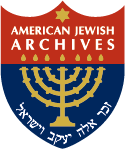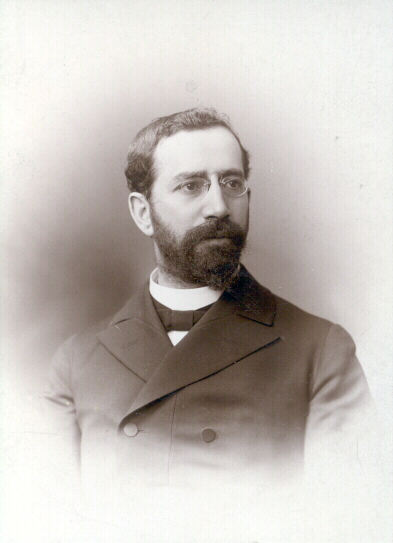TABLE OF CONTENTS

A Finding Aid to the Joseph Krauskopf Papers. 1877-1923.
Manuscript Collection No. 183
Introduction |
|
| Repository: | The Jacob Rader Marcus Center of the American Jewish Archives |
| Creator: | Krauskopf, Joseph, 1858-1923. |
| Title: | Joseph Krauskopf Papers. |
| Dates: | 1877-1923 |
| Quantity: | 1.2 linear feet (3 Hollinger boxes) |
| Abstract: | The Joseph Krauskopf papers consist of the addresses, correspondence, newspaper articles, sermons and miscellaneous items of and about Rabbi Joseph Krauskopf. Krauskopf was a graduate of the first class of Hebrew Union College known for his leadership in Reform Judaism and the Central Conference of Reform Rabbis. He was also involved in the formation of the Jewish Publication Society and National Farm School. Material, in part, is Photostat copies. Span dates for the papers are 1877-1923. |
| Collection Number: | MS-183 |
| Language: | Collection material in English and German. |
Biographical Sketch

Joseph Krauskopf was born 21 January 1858 in Ostrowo, Prussian-Posen to Hirsch Krauskopf, a local lumber merchant. After his father's death, Krauskopf immigrated to the United States in 1872 to join an half-brother, only to discover he had died. Krauskopf found work for a tea merchant in New Jersey until he entered the first class of Hebrew Union College. Krauskopf was recommended to Isaac Mayer Wise by the Christian widow of a newspaper editor, who noted that "he has all the Christian virtues."
While rooming with Henry Berkowitz, the two created a Jewish youth periodical entitled The Sabbath Visitor . This interest in education was to remain an interest for both in their post-HUC careers. Following ordination, Krauskopf accepted a pulpit in Kansas City, Missouri. He remained in Kansas City from 1883-1887 when he became the rabbi at the Philadelphia congregation of Keneseth Israel. Krauskopf was an extremely popular rabbi in both congregations- at Kansas City, his sermons were regularly published and growth in Philadelphia led to the building of a new synagogue.
Joseph Krauskopf was an avid supporter of radical reform in Judaism. In 1885, Krauskopf wrote to Rabbi Kaufman Kohler of Beth El in New York in order to propose a meeting between reform-minded rabbis. As a result of this letter, Krauskopf served as vice-president at the 1885 conference where the Pittsburgh Platform was written. Krauskopf implemented many reforms in his personal congregation including Sunday worship.
Krauskopf's interests extended well beyond Reform Judaism. In 1884, Krauskopf founded the Poor Man's Free Labor Bureau to help indigents find employment. Later, in 1894, Krauskopf received a visa via a special Congressional resolution and traveled to Russia to examine the problem of mass immigration of Eastern European Jews. While in Europe, Krauskopf met with author Leo Tolstoy who said that the key to Jewish survival was in agriculture. Impressed by a model farm school in Odessa, Krauskopf decided to start a similar program in the United States. In Doylestown, Pennsylvania, Krauskopf began the National Farm School, and supported it through lecture tours. He viewed it as "one fo the best means of securing safety and happiness to the sorely afflicted of our people."
Krauskopf was also a leader in the Jewish Publication Society. He died in Atlantic City, New Jersey on 12 June 1923. Krauskopf married twice: Rose Berkowitz in 1883 and Sybil Feineman in 1893. He had four children: Harold, Eleanore, Manfred and Madeline.
Scope and Content Note
The Joseph Krauskopf Papers are the addresses, correspondence, sermons, miscellaneous items and writings of Joseph Krauskopf, graduate of the first class of Hebrew Union College in 1883. Krauskopf was a graduate of the first class of Hebrew Union College known for his leadership in Reform Judaism and the Central Conference of Reform Rabbis. He was also involved in the formation of the Jewish Publication Society and National Farm School.
There is limited material related to Krauskopf's early years- although the Everett Literary Society Journal (1877) was an activity undertaken while Krauskopf was a student at Hebrew Union College.
The papers reflect the strong commitment of Krauskopf to radical reform in such sermons as "Shall the Jews observe Saturday or Sunday as their Sabbath?" with accompanying commentary. Materials relating to his Keneseth Israel pulpit, 1889-1906, were principally donated to the archives by Dr. Bertram Korn, and comprise the majority of the correspondence series. They focus on the activities of Keneseth Israel and reflect Krauskopf's connections with other Reform rabbis. They have little to do with his outside activities for the Jewish Publication Society or the Farm School. Some correspondents include: Henry Berkowitz, Hyman Enelow, Gotthard Deutch and Kaufman Kohler. The sermons also are heavily concentrated in the Keneseth Israel era, and include topics such as "If a Messiah had been born"(1906) and "Our Debt and Duty to the Rev. Dr. Isaac Mayer Wise." (1903) There are some sermons from earlier years in the sermons, and also in summary in newsclippings (primarily in German). Material, in part, is Photostat copies.
Arrangement
The papers are divided into two series:
- A. Correspondence. 1883-1922.
- B. Writings and Personal. 1877-1923.
Conditions of Access and Use
Terms of Access
The collection is open for use; no restrictions apply.
Terms of Reproduction and Use
Copyright restrictions may apply. Authorization to publish, quote, or reproduce, with exceptions for fair use, may be obtained through the American Jewish Archives, Cincinnati, Ohio. Please address queries to the Executive Director of the American Jewish Archives. For more information, see the American Jewish Archives copyright information webpage.
Related Material
Address, Richard. "Rabbi Joseph Krauskopf: Selected Thoughts." Term paper. Hebrew Union College-Jewish Institute of Religion. 1969. 16 p. SC-6458.
Agriculture. Documents, reports, correspondence and newsclippings concerning Jewish farmers and colonies including the National Farm School and the Woodbine, N.J. agricultural colony. New York, N.Y. 1907-1935. SC-130.
Clarion Jewish Agriculture and Colonization Colony. Articles, newspapers, clippings concerning the development and existence of the colony in Utah and the involvement of Rabbi Joseph Krauskopf and Rabbi Isaac Landman. 1914-1983. SC-2158.
Deutsch, Gotthard Papers. Manuscript Collection No. 123.
Dubow Rebecca L. "A Study of the Preaching, Ideas, Theology and the impact of Rabbi Joseph Krauskopf as reflected in his published addresses." Rabbinic thesis. Hebrew Union College- Jewish Institute of Religion. 1993. SC-14282.
Heller, Max. Manuscript Collection No. 33.
Krauskopf, Joseph. Copy of painting of Krauskopf. Flat File. Cabinet 5, Drawer 7.
Krauskopf, Joseph. Nearprint Biographies File.
Krauskopf, Joseph. Picture Collection.
Sonneschein, Solomon H. Manuscript Collection No. 360.
Administrative Information
Preferred Citation
Footnotes and bibliographic references should refer to the Joseph Krauskopf Papers and the American Jewish Archives. A suggestion for at least the first citation is as follows:
[Description], [Date], Box #, Folder #. MS-183. Joseph Krauskopf Papers. American Jewish Archives, Cincinnati, Ohio.
Provenance
The Joseph Krauskopf Papers were received from numerous donors. See card catalog for details.
Processing Information
Processed by American Jewish Archives staff.
Box and Folder Listing
| Series A. Correspondence. 1883-1922. | |||||||||||
| Scope and Content Note: The correspondence series consist of one Hollinger box mostly concerning Krauskopf's leadership in the Reform Judaism movement. Correspondence is primarily with other rabbis about congregational activities. The span dates for this series are 1883-1922. | |||||||||||
| Arrangement Note: The series is arranged alphabetically by correspondent. | |||||||||||
| Box | Folder | ||||||||||
| 1 | 1 | Correspondence. A-E. | |||||||||
| 1 | 2 | Correspondence. F-H. | |||||||||
| 1 | 3 | Correspondence. I-L. | |||||||||
| 1 | 4 | Correspondence. M-R. | |||||||||
| 1 | 5 | Correspondence. S-Z; unidentified. | |||||||||
| 1 | 6 | German material. undated | |||||||||
| 1 | 7 | German material. undated | |||||||||
| Series B. Writings and Personal. 1877-1923. | |||||||||||
| Scope and Content Note: The writings and personal series consist of two Hollinger boxes. They consist of sermons, speeches and other materials relating to his activities. Of special interest is the Everett Library Society in 1877. The span dates for these series are 1877-1923. | |||||||||||
| Arrangement Note: The sermons are arranged alphabetically. | |||||||||||
| Box | Folder | ||||||||||
| 2 | 1 | Sermons. A-C. | |||||||||
| 2 | 2 | Sermons. D-I. | |||||||||
| 2 | 3 | Sermons. J-M. | |||||||||
| 2 | 4 | Sermons. N-P. | |||||||||
| 2 | 5 | Sermons. R-T. | |||||||||
| 2 | 6 | Sermons. U-Z. | |||||||||
| 2 | 7 | Sermons. Untitled. | |||||||||
| 2 | 8 | Sermons. Untitled. | |||||||||
| Box | Folder | ||||||||||
| 3 | 1 | Autograph book. undated | |||||||||
| 3 | 2 | Everett Library Society (Cincinnati, Ohio). Journal. 1877. | |||||||||
| 3 | 3 | Funeral addresses. undated | |||||||||
| 3 | 4 | Funeral addresses. undated | |||||||||
| 3 | 5 | Miscellaneous. | |||||||||
| 3 | 6 | Will. November 1923. | |||||||||
| 3 | 7 | Newsclippings. 1886-1910; undated | |||||||||
Search Terms
The following terms have been used to index the description of this collection in the AJA's online catalog.